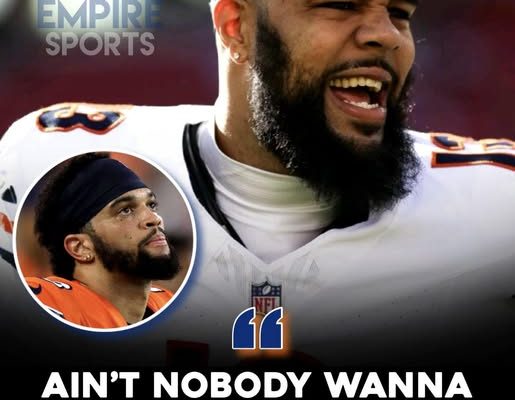After just one season with the Chicago Bears, veteran wide receiver Keenan Allen is heading back to where his NFL journey began—the Los Angeles Chargers. The move, confirmed earlier this week, marks the end of a brief and turbulent chapter in Chicago, one that Allen is not leaving quietly. In a blunt assessment of his time with the Bears, the six-time Pro Bowler made his feelings crystal clear: *“Ain’t nobody wanna play for Chicago.”*
The statement, delivered without hesitation, cuts to the core of Allen’s frustrations—a mix of skepticism about the team’s direction, dissatisfaction with its offensive identity under rookie quarterback Caleb Williams, and a belief that the Bears are far from being legitimate contenders. For a player of Allen’s caliber, a future spent in a rebuild was never part of the plan. Now, back in the familiar powder blue of the Chargers, he’s prioritizing winning over development—and he’s not shy about why he chose to leave.
### **A One-Year Experiment Gone Wrong**
When the Bears acquired Allen in a trade last offseason, the move was seen as a major coup for a franchise desperate to establish stability at wide receiver. Chicago had just drafted Caleb Williams first overall, pairing him with Allen, D.J. Moore, and Rome Odunze in what many believed could be one of the league’s most explosive receiving corps. On paper, it was a dream scenario—a young, talented quarterback surrounded by elite weapons.
But reality proved far messier. Reports surfaced throughout the season that Allen was growing increasingly frustrated with the Bears’ offensive scheme, which struggled to find consistency under first-year offensive coordinator Shane Waldron. While Williams showed flashes of brilliance, the unit as a whole failed to gel, leading to uneven performances and mounting frustrations. Allen, who turns 32 this year, is in the twilight of his career—he didn’t sign up to be a mentor on a team still figuring itself out.
“I came to Chicago thinking we were building something special,” Allen said in a recent interview. “But by midseason, it was clear we weren’t on the same page. The offense was disjointed, and I didn’t see the commitment to winning now. I’m not here to wait around.”
### **The Caleb Williams Factor**
A significant part of Allen’s frustration reportedly stemmed from his relationship—or lack thereof—with Williams. While the rookie QB has undeniable talent, his growing pains were evident, and Allen, a meticulous route-runner who thrives on timing and chemistry, never quite found his rhythm with the young signal-caller.
“Caleb’s got all the tools,” Allen admitted. “But it takes time to develop that trust, and I don’t have years to waste. I need a quarterback who knows how to use me *now*.”
That quarterback, in Allen’s eyes, is Justin Herbert—his former teammate in Los Angeles, with whom he shared an instant connection. Herbert’s arm talent and football IQ made Allen one of the most productive receivers in the league during their time together, and the chance to reunite was too appealing to pass up.
### **Chicago’s Lingering Reputation**
Allen’s comments also touch on a larger issue plaguing the Bears—their reputation as a franchise stuck in mediocrity. Despite occasional flashes of promise, Chicago has long been viewed as a team unable to sustain success, cycling through quarterbacks and coaches without ever establishing a true identity. For veteran players, especially those with limited time left in their careers, the Bears have rarely been a destination of choice.
“It’s not just about Caleb or the coaches,” Allen said. “It’s the culture. Winning organizations have a certain way of doing things, and right now, Chicago isn’t one of them.”
His words echo sentiments shared by other players who have passed through the franchise. While the Bears have made efforts to modernize their approach under GM Ryan Poles, the perception remains that they’re a step behind the league’s elite teams.
### **A Homecoming in Los Angeles**
For Allen, the return to the Chargers is a full-circle moment. Drafted by the team in 2013, he spent 11 seasons in Los Angeles (and San Diego), becoming the franchise’s all-time leader in receptions and receiving yards. His chemistry with Herbert was immediate, and together they formed one of the most dangerous QB-WR duos in football.
Now, with Jim Harbaugh taking over as head coach and the Chargers aggressively retooling their roster, Allen sees an opportunity to compete for a championship. “This is where I belong,” he said. “We’ve got the pieces to make a real run, and I’m not wasting any more time.”
### **The Fallout in Chicago**
Allen’s departure leaves the Bears with a major hole at receiver. While Moore and Odunze are still in place, losing a proven veteran like Allen removes a crucial safety net for Williams. More concerning, however, is the message it sends to other potential free agents: if a player of Allen’s stature doesn’t believe in Chicago’s vision, why should anyone else?
The Bears’ front office has downplayed the impact of Allen’s comments, emphasizing their confidence in Williams and the young core. But until the team starts winning consistently, skepticism will linger.
### **Final Thoughts: A Veteran’s Refusal to Settle**
Keenan Allen’s exit from Chicago is more than just a roster move—it’s a statement. In an era where player empowerment is at an all-time high, veterans are increasingly unwilling to spend their final years on teams that aren’t serious about winning. Allen’s return to the Chargers isn’t just about familiarity; it’s about legacy. He wants to win, and he’s not apologizing for it.
As for the Bears, the challenge is clear: if they want to attract and retain top talent, they’ll need to prove they’re more than just a rebuilding project. Until then, players like Allen will continue to look elsewhere—and they won’t always be quiet about why.



